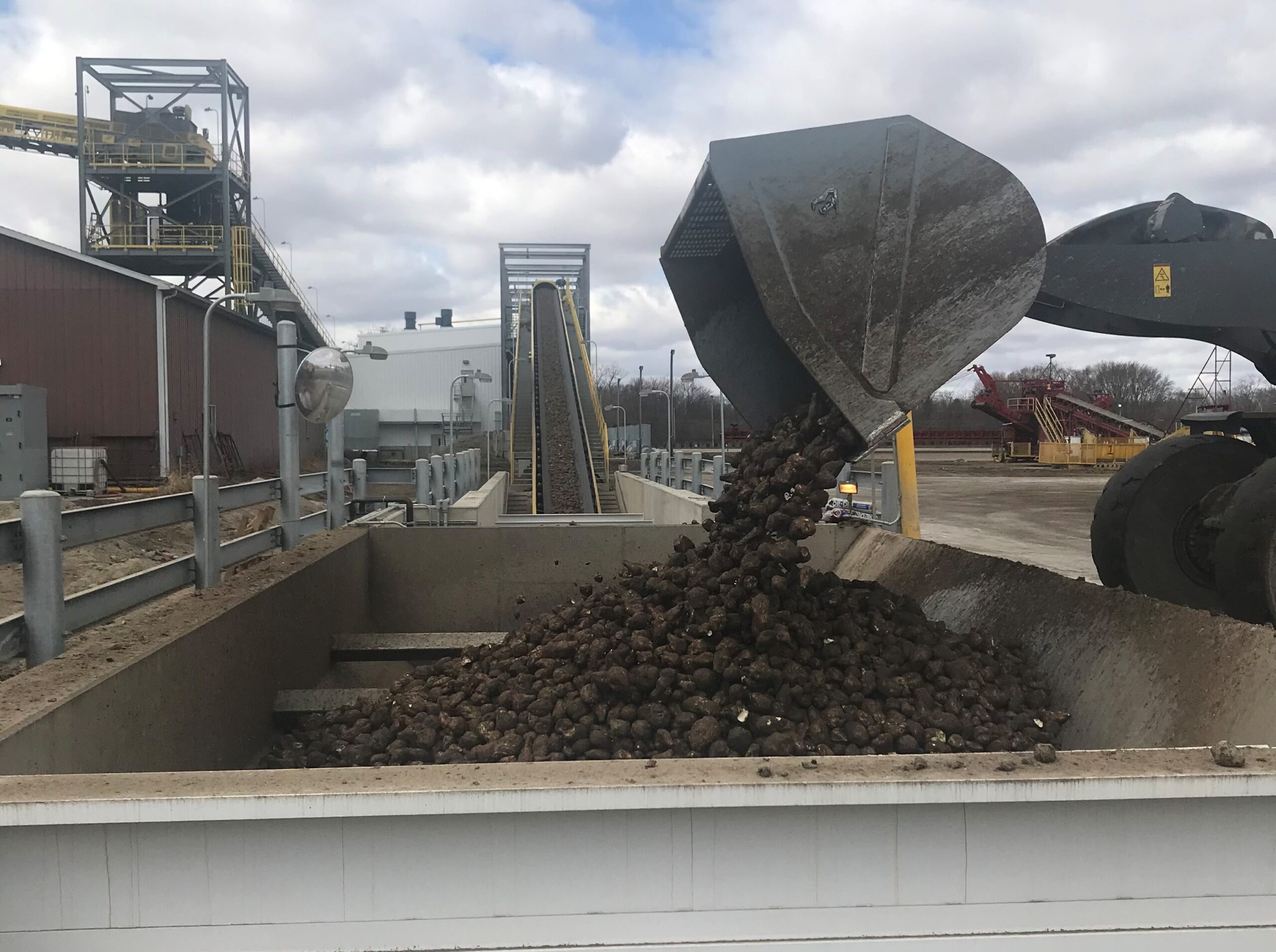Cooperative sliced 4.2 million tons of beets, will produce nearly 1.3 billion pounds of sugar
BAY CITY, MICHIGAN – Michigan Sugar Company has concluded its 2020-2021 sugarbeet slicing campaign at its factories in Bay City, Caro, Croswell, and Sebewaing.
This year’s campaign started in mid-August and wrapped up the week of March 14. Over the course of the campaign, Michigan Sugar sliced 4,277,351 tons of sugarbeets and produced more than 1.17 billion pounds of sugar from beets. Each year, after all the sugarbeets are sliced, the Bay City, Croswell and Sebewaing factories continue to produce sugar from juice and extract stored during the campaign. From juice and extract, Michigan Sugar Company expects to produce an additional 100 million pounds of sugar this year, which will bring the total sugar production to more than 1.27 billion pounds.
Additionally, the company produced more than 160,000 tons of molasses and 122,000 tons of dry pulp products and sold more than 423,000 tons of pressed pulp. All these products are sold as livestock feed.
“This year’s campaign was a huge success,” said Mark Flegenheimer, President and CEO at Michigan Sugar Company. “Our employees did an amazing job getting our sugarbeets processed and our sugar packaged and shipped, despite some unique challenges, especially in terms of staffing, that were perpetuated by the COVID-19 pandemic. We appreciate and thank our employees for the tremendous effort they put forth over the past seven months.”
Flegenheimer noted the Bay City and Caro factories finished slicing beets on Saturday, March 13; the Croswell factory finished Sunday, March 14; and Sebewaing finished Tuesday, March 16.
Michigan Sugar Company Executive Vice President Jim Ruhlman praised the cooperative’s nearly 900 grower-owners, who planted and harvested about 162,000 acres of sugarbeets this campaign.
“We were blessed this year with a beautiful crop of sugarbeets harvested by our grower-owners, who are among the most talented in the industry,” Ruhlman said. “Mother Nature not only dealt us a good hand during harvest, but she continued smiling on us throughout the campaign with weather very favorable for piling and storing sugarbeets. We had a great year for storage and as a result our factories were slicing quality beets right up to the end of campaign.
“And we all know that the higher the quality of the beets, the more sugar we can extract.”
Here is a breakdown of sugarbeet slicing production at each factory:
Factory Tons Sliced Sugar Produced Molasses Produced Dry Pulp Products
Bay City 1,594,881 461.36 million lbs. 56,623 tons 64,155 tons
Caro 688,452 193.71 million lbs. 30,152 tons 32,462 tons
Croswell 906,323 232.77 million lbs. 34,593 tons 7,354 tons
Sebewaing 1,087,695 288.45 million lbs. 39,488 tons 18,350 tons
TOTALS 4,277,351 1.176 billion lbs. 160,856 tons 122,321 tons
Michigan Sugar Company’s Vice President of Operations Jason Lowry highlighted a handful of new records achieved during the campaign at the facilities in Sebewaing and Croswell.
In Sebewaing, a new record was set for daily sugar production with 1.37 million pounds per day, besting the previous record of 1.28 million pounds per day set during the 2012-2013 campaign.
In Croswell, new records were set for tons of sugarbeets sliced (previous record was 855,834 tons in 2015-2016), total sugar produced (previous record was 229.18 million pounds in 2015-2016), and average daily slice. During this year’s campaign, the factory averaged slicing 4,275 tons per day, which beat the previous record of 4,128 tons per day set during the 2016-2017 campaign.
“This shows us that our recent investments at the Croswell factory are beginning to pay off,” said Lowry, noting a multi-year, $70 million capital upgrade project that aims to increase slicing capacity at the Croswell factory by 50 percent.
Lowry said the final year of that project is slated to be completed during the upcoming inter-campaign – the time between the end of one sugarbeet slicing campaign and the beginning of another.
“We have several significant projects planned this year in Croswell, including the construction of a new gas-fired lime kiln and installation of a new evaporator and a new mud filter press station,” Lowry said, noting total investment in the factory this year will exceed $20 million. “When all is said and done, we believe the improvements made in Croswell over the past six years will put us on track to eventually slice as many as 6,000 tons of sugarbeets per day.”
Michigan Sugar Company also plans to construct a new covered and ventilated sugarbeet storage structure in Croswell during the upcoming inter-campaign. Commonly referred to as a “hoop building,” the $5 million facility will store up to 70,000 tons of sugarbeets beginning with the 2021 crop. Michigan Sugar Company also has a hoop building in Sebewaing that was constructed about six years ago and has proven valuable in helping preserve high-quality sugarbeets for slicing right up until the end of campaigns.
Elsewhere, Michigan Sugar Company is investing $2.5 million to add a third consumer brown sugar packaging line in Bay City that will increase production by 50%. To make room for that line, the company’s industrial brown sugar packaging line is being relocated to the Sebewaing factory, which will begin packaging brown sugar for the first time. In Caro, work will be done to upgrade the site’s electrical distribution system.
Michigan Sugar Company also is purchasing three new pilers at a cost of about $5 million. The pilers will be placed in Bay City, Croswell, and Sebewaing to facilitate more efficient unloading of sugarbeet trucks beginning with the 2021 harvest.
“Inter-campaign is always a busy time of the year in our factories as we prepare for another sugarbeet slicing campaign,” Lowry said.
Just as one season ends, another begins at Michigan Sugar Company, where grower-owners are preparing to return to their fields in the coming weeks to plant this year’s crop. The first seeds already were planted on March 15 in Ontario, Canada. where the company grows about 10,000 of its acres. This year, the company expects to plant about 160,000 acres.









